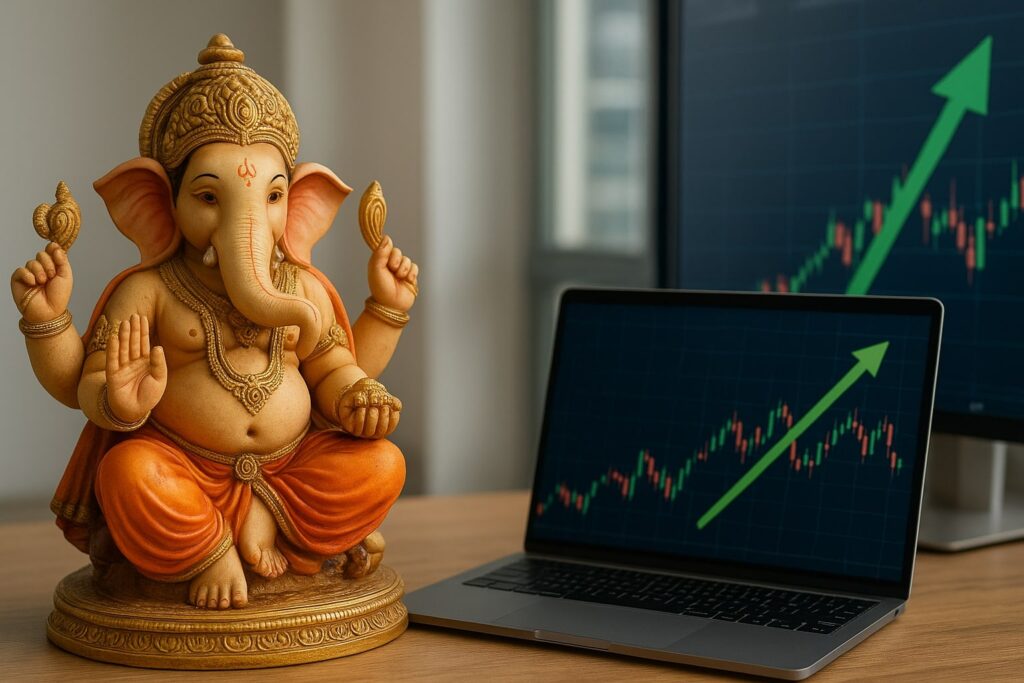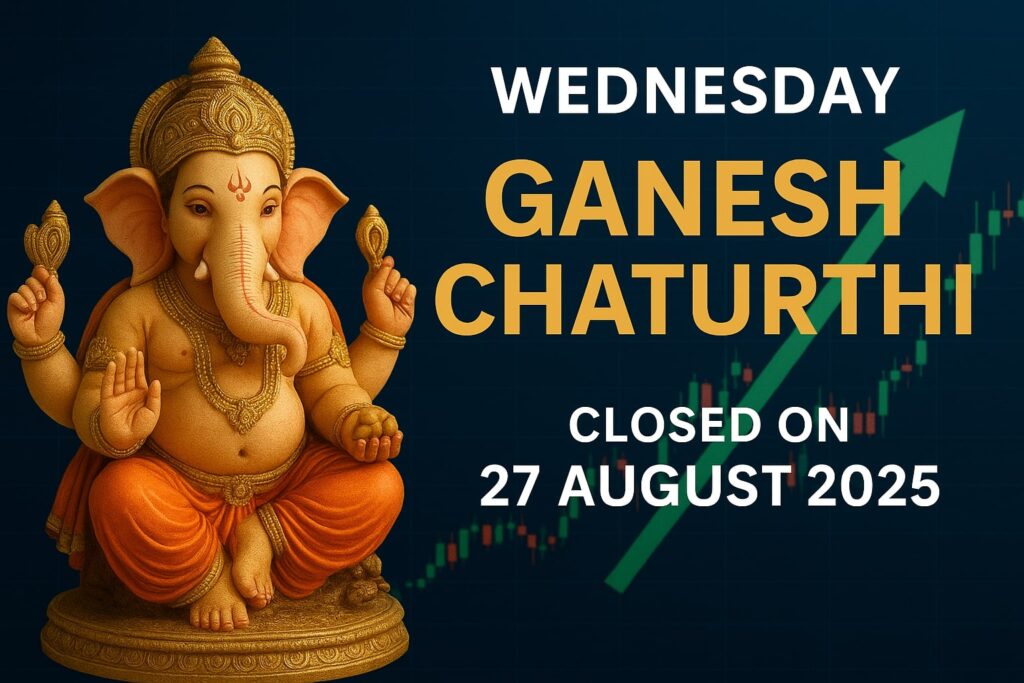If you’ve been trading for a while, you already know that the Indian stock market has its own rhythm. One of the most important, yet often overlooked, elements of that rhythm is the NSE holidays. These are the days when the National Stock Exchange remains shut, and no trading happens in equities, derivatives, or bonds. For seasoned traders, holidays aren’t just calendar markers—they are opportunities to plan smarter, review strategies, and even predict certain behavioral shifts in the market.
As of 26 August 2025, the big update on the list of NSE holidays is the closure on 27 August 2025 (Wednesday) for Ganesh Chaturthi. This single holiday in the middle of the week changes the entire trading flow. Instead of a five-day trading week, we have just four working days: 25, 26, 28, and 29 August. While this may sound like a small change, the impact of NSE holidays on trading patterns, liquidity, and even investor psychology is far more powerful than most people imagine.
This blog will take a deep dive into the role of NSE holidays in shaping investor decisions, provide you with the latest calendar of market closures, explore the effects of such breaks, and share actionable tips to maximize your trading edge.

What Are NSE Holidays & Why Do They Matter?
At its core, NSE holidays are simply days when the stock exchange is officially closed. They can be:
- National holidays such as Independence Day or Republic Day
- Religious holidays like Diwali, Eid, or Ganesh Chaturthi
- Special observances like Good Friday or Christmas
But the real question is—why should traders care about them?
- Liquidity Management – With fewer trading days in a week, liquidity tends to concentrate, causing larger swings in prices before and after a holiday.
- Volatility Risk – Mid-week holidays like Ganesh Chaturthi often amplify short-term volatility as traders rush to square positions.
- Strategic Breaks – For investors, these pauses provide breathing room to recheck portfolio weightage, global cues, and upcoming earnings reports.
- Behavioral Shifts – Retail investors often avoid fresh entries before long weekends, while institutional investors adjust FII and DII flows.
For example, during the 2024 Diwali Muhurat trading session, we saw the Nifty rally strongly due to festive sentiment, despite global weakness. The same principle applies to NSE holidays—they can bring both caution and optimism.

26 August 2025 Update – Ganesh Chaturthi Closure
The most recent confirmation from the NSE is that Wednesday, 27 August 2025, will be a full-day holiday on account of Ganesh Chaturthi.
Why does this matter? Because a mid-week closure changes market psychology:
- Short trading week: Only four trading sessions instead of five.
- Pre-holiday activity: On 26 August, traders may close short-term positions, expecting limited global reaction on the closed day.
- Post-holiday bounce: On 28 August, pent-up demand or reaction to global cues often causes sharp opening moves.
In 2023, a similar pattern was seen during Eid-ul-Fitr. The NSE closed mid-week, and when it reopened, the Sensex saw a 400-point jump in the first hour due to international developments that occurred during the holiday.
So, Ganesh Chaturthi’s NSE holiday could be more than just a break—it could be a catalyst for volatility.
NSE Holidays Calendar – 2025
Here is the full list of NSE holidays for the equity segment in 2025:
| Date | Day | Holiday |
|---|---|---|
| Jan 26 | Sunday | Republic Day |
| Feb 26 | Wednesday | Maha Shivaratri |
| Mar 14 | Friday | Holi |
| Mar 31 | Monday | Eid-ul-Fitr |
| Apr 10 | Thursday | Mahavir Jayanti |
| Apr 14 | Monday | Dr. Ambedkar Jayanti |
| Apr 18 | Friday | Good Friday |
| May 1 | Thursday | Maharashtra Day |
| Aug 15 | Friday | Independence Day |
| Aug 27 | Wednesday | Ganesh Chaturthi |
| Oct 2 | Thursday | Gandhi Jayanti |
| Oct 21 | Tuesday | Diwali Laxmi Pujan (Muhurat Trading) |
| Oct 22 | Wednesday | Diwali Balipratipada |
| Nov 5 | Wednesday | Guru Nanak Jayanti |
| Dec 25 | Thursday | Christmas |
It’s worth noting that Diwali always includes a special Muhurat Trading session. Even though the exchange is technically closed, there is a one-hour symbolic window when traders participate in auspicious buying.
How NSE Holidays Shape Weekly Trading
Take the current week of 25–29 August 2025 as an example:
- Monday (25 Aug): Market opened flat, cautious ahead of the holiday.
- Tuesday (26 Aug): Pre-holiday volatility expected, as short-term traders adjust.
- Wednesday (27 Aug): NSE holiday – no trading.
- Thursday (28 Aug): Market likely to gap open, depending on U.S. Fed commentary and Asian market cues.
- Friday (29 Aug): Weekly expiry preparation adds extra volatility.
This four-day week forces traders to consolidate strategies faster, which often results in sharper intraday moves.
Impact on FII and DII Flows
Foreign Institutional Investors (FII) and Domestic Institutional Investors (DII) activity often tells us how holidays affect big money movement. For instance, in the week of Independence Day 2025, FIIs sold around ₹1,200 crore worth of equities in the two sessions before the holiday, only to return with fresh buying of nearly ₹1,500 crore once markets reopened.
Expect similar flows around the Ganesh Chaturthi NSE holiday—short-term caution followed by renewed activity post-closure.
Broader Impact of NSE Holidays
Holidays don’t just pause trading—they influence market rhythm in subtle but important ways:
- Derivatives Expiry: If a holiday falls near monthly expiry, it can intensify futures and options adjustments.
- Retail Sentiment: Retail investors often reduce risk before festive holidays, waiting for clarity.
- Global Events: Holidays create a time-lag in reacting to global developments—sometimes good, sometimes harmful.
For example, during the 2020 U.S. Presidential Election, Indian markets were closed for Diwali. When they reopened, the Nifty had to immediately catch up with global rallies—resulting in a huge 500+ point jump in a single day.
Tips to Maximize NSE Holidays
- Use holidays for portfolio review – Rebalance sectors, check stop-losses.
- Track global cues – A closed Indian market doesn’t stop global news. Stay prepared.
- Avoid over-leverage – Mid-week holidays increase overnight risk.
- Stay disciplined – Don’t rush trades just because the market will be shut.
- Educate yourself – Use the break to read, analyze, or backtest strategies.
FAQs About NSE Holidays
Q1. Are NSE holidays the same for BSE?
Yes, in most cases both NSE and BSE follow the same holiday list.
Q2. Will commodity trading also stop on NSE holidays?
Equity and derivatives trading closes, but commodity markets may follow a different holiday schedule.
Q3. How do NSE holidays affect intraday traders?
They compress liquidity and increase volatility before and after the holiday.
Q4. Is Muhurat Trading a real trading session?
Yes, but it’s symbolic. The volume is lower, but sentiment is festive and often bullish.
Conclusion
Far from being just days off, NSE holidays play a crucial role in shaping how investors and traders act. With Ganesh Chaturthi on 27 August 2025 bringing the latest mid-week closure, smart investors are already planning moves before and after the break.
If you treat holidays not as interruptions but as opportunities to refresh strategies, you’ll see them as an ally, not a challenge. From planning portfolios to predicting volatility, NSE holidays are hidden tools in your trading journey.
So as you sip your morning tea on Ganesh Chaturthi without checking the ticker, remember—the pause itself may be the best trading move of the week.
